|
|
|
Sort Order |
|
|
|
Items / Page
|
|
|
|
|
|
|
| Srl | Item |
| 1 |
ID:
174699
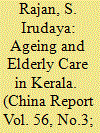

|
|
|
|
|
| Summary/Abstract |
This article presents an overview of the elderly in Kerala and describes various dimensions of elderly care and concerns, based on data from the Kerala Ageing Survey (KAS) 2013, conducted by the Centre for Development Studies (CDS), Thiruvananthapuram, Kerala. The article looks into the main issues, policies and programmes related to ageing and elderly care practices in Kerala and also addresses the basic care response at three levels: household, institutional and society. The ageing process in Kerala is witnessing an increase in the ratio of elderly population along with fundamental changes in families and communities. Hence, in order to accommodate the needs of the ageing population in society, various systems need to be reconstructed. The concerns and issues surrounding the ageing population requires long-term attentiveness and forward planning, where policies must be adopted with consideration for cultural and social contexts. Care for the elderly should focus on a holistic combination of health care, socio-economic protection and provision of a suitable environment for better quality of life.
|
|
|
|
|
|
|
|
|
|
|
|
|
|
|
|
| 2 |
ID:
112367
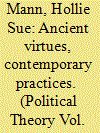

|
|
|
|
|
| Publication |
2012.
|
| Summary/Abstract |
Earlier discussions of care have both insisted on its importance to political life and decried the unequal burden borne by women in care work. Yet they have failed to demonstrate why for reasons above and beyond the instrumental ends it serves. We ought to make the cultivation of an ongoing practice of caregiving a political priority. This article redefines and reframes care as a thoroughly critical and deeply embodied practice that is central to the flourishing of human beings. By way of Aristotle, I situate philia and embodied practices of care at the center of the shaping of the citizen and demonstrate a deeper significance of relations of care to our political life. When this is done alongside attention to habituation to right action and thinking, we can see more clearly how a particular kind of embodied politics can activate and sustain an ethic that cultivates citizens' capacities and desires to care.
|
|
|
|
|
|
|
|
|
|
|
|
|
|
|
|
| 3 |
ID:
191708
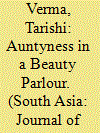

|
|
|
|
|
| Summary/Abstract |
Interactive service work in various middle- and upper-class settings has created visible disparities between those who seek the work and those who provide it. In addition to beauty work, beauty parlours require emotional/affective work, widening the class gap between sellers and consumers by requiring further labour on the part of the worker. However, within the smaller beauty parlours existing in the by-lanes of larger Indian markets, there is the possibility of creating shared space through conversations and care through a mobilisation of ‘auntyness’. In this paper, I explore how the conversations in a New Delhi beauty parlour lead to the creation of aunties that challenges the limits of interactive service work and enables temporary communities of kinship and care that hinge upon the participants’ performances of the styles, affects and values associated with aunties.
|
|
|
|
|
|
|
|
|
|
|
|
|
|
|
|
| 4 |
ID:
180002
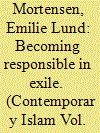

|
|
|
|
|
| Summary/Abstract |
Taking an ethnographic point of departure in the stories of three Syrian middle-class men in Amman, Jordan, in this article, I zoom in on the role of care in the everyday of exile, as I explore the young men’s attempts to be “responsible” young men despite challenging circumstances. Guided by Ahmed’s (2006) notion of lifelines, defined as those which direct us and allow us to find our way (ibid.: 12–14), I demonstrate how gendered norms and notions became objects of reflection and experimentation in exile, both enabling and forcing the young men I worked with to think through other ways of leading life as a man. Finding further inspiration in Naguib’s (2015) and Ghannam’s (2013) works on masculinity and care in the Middle East, I consider care as central to the process of negotiating a masculine identity in general as well as to the reconfiguration of a meaningful masculine position in exile specifically.
|
|
|
|
|
|
|
|
|
|
|
|
|
|
|
|
| 5 |
ID:
180003
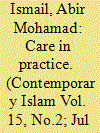

|
|
|
|
|
| Summary/Abstract |
Recent studies conclude that ethnic minority families in Denmark tend to be dismissive of senior housing and municipal homecare services for elderly family members. A large proportion of Muslim minority families in Denmark attach great importance to caring for the elderly as a tradition and prefer to take care of their own elderly family members at home. Nevertheless, the fact that morality, incentives, and obligations in relation to care for the elderly may be legitimized and/or contested with reference to cultural traditions and Islam has not received much attention in current research. In this article, drawing on material from ongoing ethnographic fieldwork among Arab Muslim families in Denmark, I discuss how cultural and religious backgrounds may determine and influence perceptions and behavior regarding care for the elderly. By observing and engaging in the everyday life of an Arab Muslim family, I explore how caring for elderly people with health problems at home raises specific questions about obligations and triggers negotiations across genders and generations. I argue that besides kinship and ethnicity, it is equally important to consider religiosity in an attempt to learn more about how Arab Muslims care for their elderly family members.
|
|
|
|
|
|
|
|
|
|
|
|
|
|
|
|
| 6 |
ID:
192177
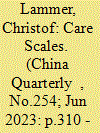

|
|
|
|
|
| Summary/Abstract |
Examining the “world's largest cash-based social policy” through the lens of care reveals widely shared scalar imaginaries and the productivity of care in constituting scale. In standardizing the minimum livelihood guarantee (dibao), officials, applicants and researchers in rural Sichuan cited both “too much” and “not enough” care at the scale of the family in recommending or rejecting state assistance. Different levels of organization (scale1) were not stable bases with specific sizes and qualities (scale2) that enabled or limited care. Dibao-related practices were evaluated as an appropriate (“filial piety”), insufficient (“individualism”) or excessive (“corruption”) amount of family care. Care became an indicator of kinship measurements and a marker of state boundaries. Thus, scale (in both meanings) was enacted in China, as elsewhere, through negotiations of needs and responsibilities, through evaluations of care practices and their outcomes. In this sense, care scales.
|
|
|
|
|
|
|
|
|
|
|
|
|
|
|
|
| 7 |
ID:
086011


|
|
|
|
|
| Publication |
2009.
|
| Summary/Abstract |
'Women's empowerment', as used by international development organisations, is a fuzzy concept. Historical textual analysis and interviews with officials in development agencies reveal its adaptability and capacity to carry multiple meanings that variously wax and wane in their discursive influence. Today a privileging of instrumentalist meanings of empowerment associated with efficiency and growth are crowding out more socially transformative meanings associated with rights and collective action. In their efforts to make headway in what has become an unfavourable policy environment, officials in development agencies with a commitment to a broader social change agenda juggle these different meanings, strategically exploiting the concept's polysemic nature to keep that agenda alive. We argue for a politics of solidarity between such officials and feminist activists. We encourage the latter to challenge the prevailing instrumentalist discourse of empowerment with a clear, well articulated call for social transformation, while alerting them to how those with the same agenda within international development agencies may well be choosing their words with care, even if what they say appears fuzzy.
|
|
|
|
|
|
|
|
|
|
|
|
|
|
|
|
| 8 |
ID:
192176
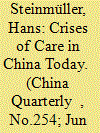

|
|
|
|
|
| Summary/Abstract |
The introduction to this special section presents an overview of crises of care in China today, specifically as they affect the fields of kinship, health and government. To study care ethnographically, we distinguish between the attentive and active dimensions of care: what people care about, and how they care for others. Acts of care always relate to larger concerns and general values, but they scale up in different ways. The imbalances that emerge are central to the politics of care that our contributors describe. Care as attentive co-growth engages different values, remakes inequality and nourishes political life. The contributors use the same framework of attention, action and politics to investigate crucial issues in Chinese society, including family, health, environment, ritual and animals. In all these fields, care provides a privileged vantage point from which to understand social and moral change in China today.
|
|
|
|
|
|
|
|
|
|
|
|
|
|
|
|
| 9 |
ID:
149686
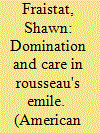

|
|
|
|
|
| Summary/Abstract |
Domination, understood as the abusive or capricious employment of power over others for the sake of one's own ends, is among the gravest threats to human freedom. Solving the problem of domination is a crucial normative challenge, and this article identifies in the work of Jean-Jacques Rousseau a promising and overlooked avenue for addressing it. I propose an interpretation of Rousseau's Emile in which preventing domination requires moral education in the practice and value of care. This interpretation gives Rousseau new relevance as a theorist of domination. In connecting non-dominative to educative care, Rousseau's approach has the potential to forge new connections between neo-republican theories of domination and feminist care ethics, even suggesting new routes by which public policy might foster a non-dominative society.
|
|
|
|
|
|
|
|
|
|
|
|
|
|
|
|
| 10 |
ID:
180004
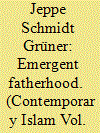

|
|
|
|
|
| Summary/Abstract |
This article explores how new practices and articulations of fatherhood are emerging
among Muslim men in Denmark. With an explicit focus on care as both practice and
ideal, the article accounts for the emergence of new forms of fatherly commitment,
intimacy, and caregiving in domestic life. Drawing on ethnographic material from
different social housing areas in and around the city of Copenhagen, I show how these
new practices and imaginaries of fatherhood are assemblages of both Islamic ethics and
values afforded by the Danish welfare state. Exploring the interlacement of care, Islam,
and fatherhood in Denmark, the article provides a nuanced perspective on the various
social roles of Muslim men as both fathers, sons, and husbands.
|
|
|
|
|
|
|
|
|
|
|
|
|
|
|
|
| 11 |
ID:
179997
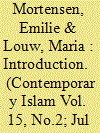

|
|
|
|
|
| Summary/Abstract |
What do we, as human beings—religious, non-religious, Muslim and non-Muslim—care about, and how do experiences of caring and being cared for come to shape the way we lead our lives with and among others? In this special issue, we set out to explore the relations between Muslims and various religious and non-religious others through the concept of ‘care’. Doing this, we dwell specifically on what we describe as tensions in care relations and the way they are experienced, thought of, conceptualized and negotiated: 1) tensions between individual aspirations and care for others 2) tensions between care as duty and care as pleasure and ground for human flourishing 3) tensions between practical and emotional dimensions of care 4) tensions between universal and cultural or ideological aspects of care and 5) tensions between state projects of care and religiously motivated care practices.
|
|
|
|
|
|
|
|
|
|
|
|
|
|
|
|
| 12 |
ID:
193146
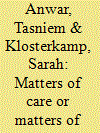

|
|
|
|
|
| Summary/Abstract |
International treaties and European directives have put new legal responsibilities on EU member states to pre-emptively monitor and prosecute terrorist activities and offences. In particular, the prosecution of terrorism financing has been an important focus to prevent material and ideological support for terrorist organisations. Yet, a clear distinction between humanitarian aid and terrorism financing in a complex war zone is not always easy to draw: Which of the involved parties is perceived as a terrorist threat, and what is exactly considered humanitarian aid work? In this paper, we empirically unpack how EU counter-terrorism laws and policies are actually practiced during court trials. We investigate the legal distinction between humanitarian aid and terrorism financing in Syria, specifically centring on trials from the Netherlands and Germany. Drawing on the growing debates in critical security and legal studies on materiality, we focus on how materials presented during trials such as baby products, weapons, and money, are inscribed with a particular security logic to reach a legal verdict. Introducing the concept of “matters of care/security”, we connect these debates and findings to insights from feminist and post-colonial studies to critically inquire how racialised and gendered assumptions on terrorist threat impact terrorism trials.
|
|
|
|
|
|
|
|
|
|
|
|
|
|
|
|
| 13 |
ID:
182975
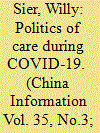

|
|
|
|
|
| Summary/Abstract |
This article employs the concept of care as a lens through which to examine the anti-COVID-19 measures taken in post-lockdown Wuhan. Based on photographs that depict the Chinese response to COVID-19 at the epicentre of the virus outbreak, the article analyses the visibility of anti-virus measures as a form of government communication inscribed textually and symbolically onto the urban landscape. The state demonstrates its care and capability by implementing highly visible high-tech measures to contain the virus. Bringing care into the literature on crisis management in China sheds light on the Chinese state’s reaction to COVID-19 in eliciting nationalist sentiments and positive feelings of cooperation while stigmatizing critical voices as uncooperative and unpatriotic. It shows that care is central not only to the functioning of liberal democracies: the Chinese state also relies on narratives about care to showcase the superiority of its political system and to distinguish between desirable and unwanted forms of citizens’ political engagement after the COVID-19 outbreak.
|
|
|
|
|
|
|
|
|
|
|
|
|
|
|
|
| 14 |
ID:
185116
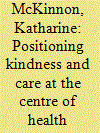

|
|
|
|
|
| Summary/Abstract |
The mainstream development agenda highlights how important access to health care is for poorer regions of the world. In the area of maternal health, this is expressed in a concern to drive down rates of maternal morbidity and improve access to maternal health care services. While important, the focus on metrics misses the way that relations of care are fundamental to good health. This paper takes an example of a project which is offering a different approach to health and development in the resource scarce environment of Luang Prabang Province, in northern Laos. Here, a group of antipodean midwives has partnered with provincial health authorities to offer a midwifery training programme to health workers posted in remote rural health centres. Supported by the analytical tools of diverse economies, this paper explores how this programme centres relationality, collectivity and an ethic of kindness, and discusses the advantages of being relationship based, small and informal. The paper concludes that this training programme can be understood as an example of a community economy of care: based on global networks of care instead of formal development programmes built on global networks of bureaucracy.
|
|
|
|
|
|
|
|
|
|
|
|
|
|
|
|
| 15 |
ID:
175167
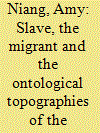

|
|
|
|
|
| Summary/Abstract |
An examination of the figure of the slave and the figure of migrant make visible important historical interconnections that sustain past and present elaborations of the human and ‘the international’. These interconnections have always been racialised and they have structurally constituted the making of an interdependent world community. A series of instrumentalised discourses, at times turned into rationalities that govern policies towards migrants, particularly in a post 9/11 context, increasingly normalises the idea that there are people that can be justifiably expelled from the civic/civil, and increasingly human sphere. The slave was forcefully removed, both physically from attachment to kin and land, and morally from the history of humankind. The migrant is pushed out of the bounds of the livable as well as the moral category of rights-bearer. The commonalities that configure both phenomena are rooted in an extractive supply economy and a hierarchised ordering of humans. The article uses the history of Frederick Douglas to show that the absence of ‘care’ as methodology of relationality limits the valence of interdependence as a marker of a globalised world. In doing so, it challenges the unexamined assumptions of new/posthumanism that advocates radical interdependence without interrogating the modalities of ‘humanity’ among different categories of humans.
|
|
|
|
|
|
|
|
|
|
|
|
|
|
|
|
| 16 |
ID:
105937
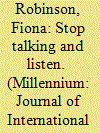

|
|
|
|
|
| Publication |
2011.
|
| Summary/Abstract |
This article seeks to extend feminist critiques of Habermasian discourse ethics in International Relations by engaging with the feminist ethics of care. Using the work of Andrew Linklater as a starting point, it argues that neither the existing critiques nor the responses have adequately addressed the key features of care ethics. The article critiques the idea of ethics as dialogue among 'human beings as equals' through an elaboration of several features of the ethics of care: firstly, the importance in care ethics of 'dependency' and 'vulnerability' not as conditions to be overcome, but rather as ways of being for normal human subjects; secondly, the focus on the responsibilities for listening attentively to the voices of others rather than on rights of individuals to be included in dialogue; thirdly, the need for patience and commitment in the recognition that responsibilities to others are fulfilled over the long, rather than the short, term; and, finally, the idea of care ethics as a substantive, democratic ethic of responsibility. These arguments emerge out of the basic ideas of care ethics - that relations and responsibilities of care are central to human life, and that care is a public value that must be negotiated at a variety of levels, from the household to the international community.
|
|
|
|
|
|
|
|
|
|
|
|
|
|
|
|
| 17 |
ID:
190915
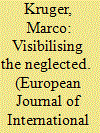

|
|
|
|
|
| Summary/Abstract |
The shift of responsibility from the state and public authorities to the individual and the local level is one of the most common critiques of resilience policies. Individuals are portrayed as self-responsible entrepreneurs of their own protection. This article proposes a more nuanced reading of this process by arguing that resilience also entails an emancipatory potential. Drawing on an analysis of the German disaster management system and its structural marginalisation of care-dependent people, the article discusses the potential of resilience to make so far neglected needs visible. This visibilisation is the precondition for the recognition and, subsequently, the societal negotiation of the various needs and resources. Recognition and material redistribution may then be the yardstick for assessing the legitimacy of a shift of responsibilities that rests on the appropriate consideration of power, privileges, and abilities of the respective referent object of responsibility. Taking up the Frankfurt School's tradition of immanent critique, security scholars should not restrict themselves to exercise the necessary critique of problematic resilience policies, but engage in carving out how resilience can contribute to freeing rather than burdening the (precarious) individual.
|
|
|
|
|
|
|
|
|
|
|
|
|
|
|
|
| 18 |
ID:
161165
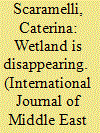

|
|
|
|
|
| Summary/Abstract |
This article analyzes the transformation of the Kızılırmak Delta on the Black Sea coast of Turkey into a Turkish wetland. This production involved the transformation of international categories of wetlands into national imaginaries, as well as the material remaking of landscapes themselves. Population and agro-economic shifts concurrent to the formation of the Turkish nation-state transformed the delta into an agricultural landscape, and subsequently into a contested conservation area whose use is informed by changing Turkish and international notions of wetlands. I focus on the situated, local processes and practices through which wetlands are produced and become relevant to different social groups as subjects of scientific knowledge and environmental imaginations. These, I argue, have rendered the wetland an open-air laboratory and an object of care for environmental advocates, scientists, and residents.
|
|
|
|
|
|
|
|
|
|
|
|
|
|
|
|
| 19 |
ID:
180000
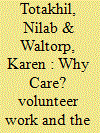

|
|
|
|
|
| Summary/Abstract |
Why care—and care for whom? This article examines how care through volunteer work is ascribed meaning by young Afghan-Danes in a context of various expectations and demands on them from family and peers in Denmark, Afghanistan and elsewhere. Focusing on volunteers in their 20 s, with varying roles of responsibility in volunteer associations in Denmark, we pay attention to different articulations of motivations to engage, and to volunteering trajectories. We discuss how young Afghan-Danes’ engagement is situated in a particular Danish tradition of volunteer work, and how both Denmark and Afghanistan figure prominently in the motivations for volunteering. The young people engage and invest here and there, drawing on ideas of universal humanity and Muslim caring for others in their volunteer efforts, and involvement in politics in Denmark. Young Afghan-Danes find it imperative to ‘give back’, and the care involved in this is primary, while an awareness of building network and bettering the CV exists simultaneously. It is suggested that volunteer work is popular among young Afghan-Danes due to Muslim ethics of care and a Danish tradition of democratic, free (volunteer) associations aligning well, as long as the young Afghan-Danish volunteers choose to downplay friction and contention, and foreground the commonalities between ethical sensibilities and demands in the traditions, they draw on. It is argued that this navigation of expectations and ideas of moral personhood from the Afghan and Danish sides is something they are particularly skilled at due to their specific position and ‘composite habitus’.
|
|
|
|
|
|
|
|
|
|
|
|
|
|
|
|
| 20 |
ID:
117488
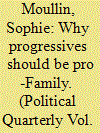

|
|
|
|
|
| Publication |
2012.
|
| Summary/Abstract |
For egalitarians, families are part of the problem. By bringing together advantages and passing on to their children, families redouble and (literally) reproduce inequalities. And, by cordoning off a private sphere into which government cannot roam, the family marks the limits of any progressive agenda. But defending families should be part of any answer to social injustice. Family relationships should be seen as a primary good: we need close, caring committed relationships no matter what else we want in life. Families are also increasingly important to one's chances in life. The gulf is widening between those rich and those poor in family life. This should worry egalitarians because lacking good, stable family relationships is a major disadvantage, and one that holds back progress towards other aspects of social justice.
|
|
|
|
|
|
|
|
|
|
|
|
|
|
|
|
|
|
|
|
|